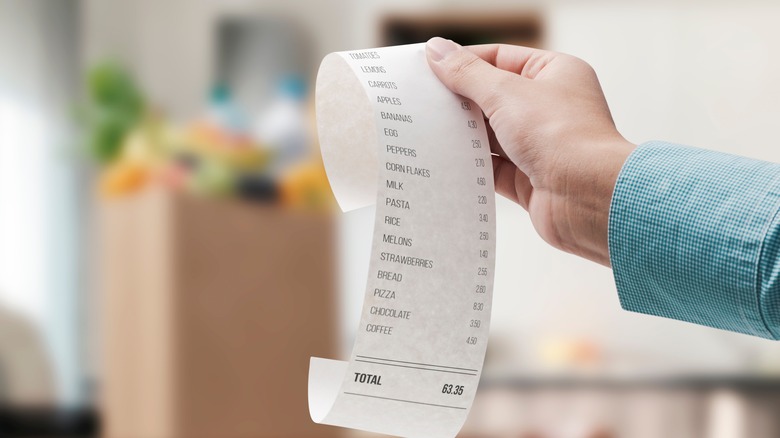It Literally Pays To Use Aldi's Return Policy For Groceries
Just as Costco's refund hack helps you save money on groceries, so does Aldi's return policy. Not only can you return broken or unsatisfactory items for a full refund or even a replacement, but you can also return items you didn't intend to buy in the first place. Yes, we're talking about those impulse purchases, spurred by a growling stomach or an unconscious weakness for the sneaky marketing strategies used in the checkout lane.
Whatever the case may be, Aldi allows you to return any product to the store, no questions asked. Considering how the average American makes $300 in impulse purchases each month, according to Slick Deals, Aldi's generous refund policy can help you get a fair chunk of that money back. That king-size candy bar, bag of potato chips, and on-sale wine can all be returned and refunded in their entirety. All you need is the item itself, its original packaging (if possible), and proof of purchase. No need to hang onto unwanted items!
Don't like an Aldi snack? Save money and take it back
Similar to how you might change your mind about an impulse purchase once you get home, you might find yourself feeling differently about an Aldi item once you've tried it. Maybe you thought you would try a new flavor of ice cream highlighted in the elusive Aldi Finds section, only to remember a few bites in that you don't like macadamia nuts. No problem, just take the ice cream back to the store for a refund or even swap it for a flavor you do like.
Again, all you need to return the product is proof of purchase, whether that be a receipt, a credit card statement, a bank statement, etc. The product can be open and half-eaten, and still eligible for a full refund. Surprisingly, the only real caveat with returning food items to Aldi is that you do so within a 60-day window. For electronics and other non-food items, the return period extends up to 90 days, if not longer. Aldi is all about customer satisfaction, so employees are more than happy to work with you if you're unhappy with a purchase.
Tips to avoid making impulse purchases at the grocery store
A good deal of impulse purchases are the result of intentional marketing strategies, whether that's eye-catching grocery store end caps, deals too good to pass up, or subliminal encouragement to treat yourself. As such, one way to reduce impulse spending is to keep an eye out for any grocery store's psychological tricks.
For instance, never take a sale sign at face value; the promoted "deal" may only be a few cents less. Instead, always check the original price to see if you're actually getting a good deal and not just being tricked into a purchase. End caps and center-aisle displays are particularly notorious for this strategy.
Likewise, if you feel inclined to buy a product because the price is shockingly low, ask yourself if you need that product. Don't let a low price sway you into thinking you need to buy an item. Rather, stick to your grocery list, and buy only what you came into the store intending to buy, not what the store wants you to buy. Having a snack before shopping can also help limit impulsivity due to hunger.



